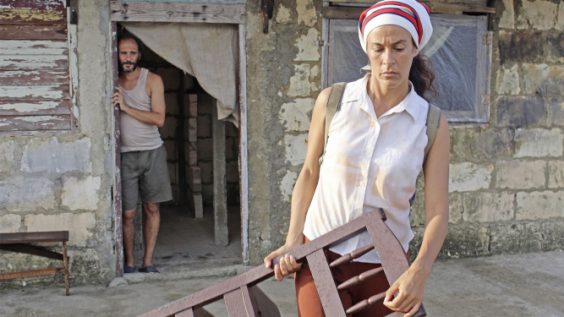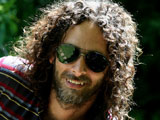Castro Censorship Contaminates Havana Film Festival New York
by Orlando Luis Pardo Lazo translated by Alex Higson / March 22, 2017 / No comments

Santa y Andres. Via vistarmagazine
Claiming political neutrality, organizers of the Havana Film Festival New York cancel showings of Cuban filmmaker Carlos Lechuga’s Santa y Andrés. Their censorship harkens back to the 1960’s persecution of homosexuals under the Castro regime.
I feel sad to be writing these lines. I feel sad for this country that gave me refuge from the repression that I suffered in Castro’s Cuba. It is painful to witness the moral decline of the United States of America: A nation that for Cubans is no longer synonymous with democracy, nor an ally in the struggle for civil rights. Rather, it is quite the opposite: An enemy infected with ideological intolerance and, worse, complicity with many of the world’s dictatorships, especially the largest in this hemisphere—the so-called Cuban Revolution (a regime that, since January 1, 1959, has not been freely elected by any Cuban).
Anything that tyranny touches is instantly tyrannized. That is the law of the uncivilized jungle. Now it’s the Havana Film Festival of New York’s turn. This 18th annual event will be held between March 30 and April 7, 2017. The organizers of this festival of cinematography have just censored the Cuban film Santa y Andrés, directed by Cuban filmmaker Carlos Lechuga. His movie will no longer be in the running for the festival’s award, the Havana Star Prize. As compensation, the film will be screened only outside of the competition. Like a rara avis fallen from another planet, the movie is to be treated like an infected animal—isolated from all international legitimacy—or a rather disgusting artifact that must be left in the hands of archeologists (and the tentacles of Castro’s state security, which reach across the democratic world).

- Is it worth-while to focus on the last images and letters coming from the inside of the last living utopia on Earth? Is Cuba by now a contemporary country or just another old-fashioned delusion in the middle of Nowhere-America? A Cold-War Northtalgia maybe? Can we expect a young Rewwwolution.cu within that Ancien Régime still known as The Revolution? I would like to provoke more questions than answers.

- Orlando Luis Pardo Lazo was born in Havana City and still resides and resists there, working as a free-lance writer, photographer and blogger. He is the author of Boring Home (2009) and is the editor of the independent opinion and literary e-zine Voces.
The executive director of the festival, Carole Rosenberg, immediately entered a state of denial, that peculiar cynical syndrome suffered by innocent intellectuals in the face of left-wing dictatorships. These dictatorships dress themselves up, as commanded by Marx and the Market, as proletariat utopias fighting global capitalism.
On March 16th, Rosenberg told El Nuevo Herald newspaper that her festival had not come under pressure from Havana, where Santa y Andrés has also been censored. Instead, she claimed, the festival organizers had decided themselves to pull the movie out of the running—after having announced it as part of the program—“owing to the political undertones of what has been published online.” The organizers claimed that: “Our mission is to build bridges, and we have always steered well clear of both countries’ political matters.” To put it more bluntly, “we don’t get involved in political gossip.”
Santa y Andrés has been censored simply because it tells a cuttingly sincere story of repression against a homosexual writer during the 1980s in Castro’s Cuba. Period. The Havana Film Festival of New York has censored it out of fear and mediocrity. Because in Castro’s Cuba, you first have to be a revolutionary if you wish to become a writer. Because in Castro’s Cuba, there are no homosexuals who have not first declared themselves revolutionary subjects. Rosenberg doesn’t remember the labor camps where many writers, homosexuals, and—horror of horrors—homosexual writers, were imprisoned on the island at the end of the 1960s. And the Cuban state has never apologized.
In any case, Santa y Andrés has already been shown freely at festivals in Toronto, San Sebastián, Zurich, Geneva, the Dominican Republic, Cartagena, Guadalajara, and Punta del Este, among others—but in New York, it will be ridiculously and pathetically screened at the silk-gloved hands of Castro-ist censorship.
The Havana Film Festival of New York began in 2000 as an initiative of the American Friends of the Ludwig Foundation of Cuba, a nonprofit organization that supports the Fundación Ludwig de Cuba, a supposed NGO based in Havana—even though, in reality, all NGOs on the island must operate as part of the Cuban state itself.
Even though the festival’s website declares that, “The films chosen each year reflect strong cultural and social identities rooted in their respective countries,” it is clear that the underlying themes of 2017’s event will be weakness, hypocrisy, and deceiving the stupefied North American consumer. It is purposeful that on the festival’s website, its organizers unabashedly declare that they collaborate with Havana’s International Festival of New Latin American Cinema, the very event that censored Santa y Andrés in Cuba at the end of 2016.
But perhaps the hidden reason behind Rosenberg’s censorship of Carlos Lechuga is that the president of the National Union of Writers and Artists of Cuba (UNEAC), Miguel Barnet—a communist politician who is a member of the Cuban Parliament (a body that has unanimously approved all state laws made from 1976 to this day)—is the guest of honor at the New York festival. That’s the same Miguel Barnet who, shortly before Fidel Castro’s death in 2016, declared, “Fidel is the agent and author of the Cuban cultural revolution and its politics,” in celebration of the 55th anniversary of the “Words to the Intellectuals” speech, in which Castro forcefully imposed the Mussolini-esque dictum, “Within the Revolution, everything. Against the revolution, nothing.”
Castro-ism or no Castro-ism. To censor or not to censor. That is the key Cuban question. No further questions, Your Horror.
PS: The director of the film has now decided not to participate at all in the New York Festival. To learn more, go here.




